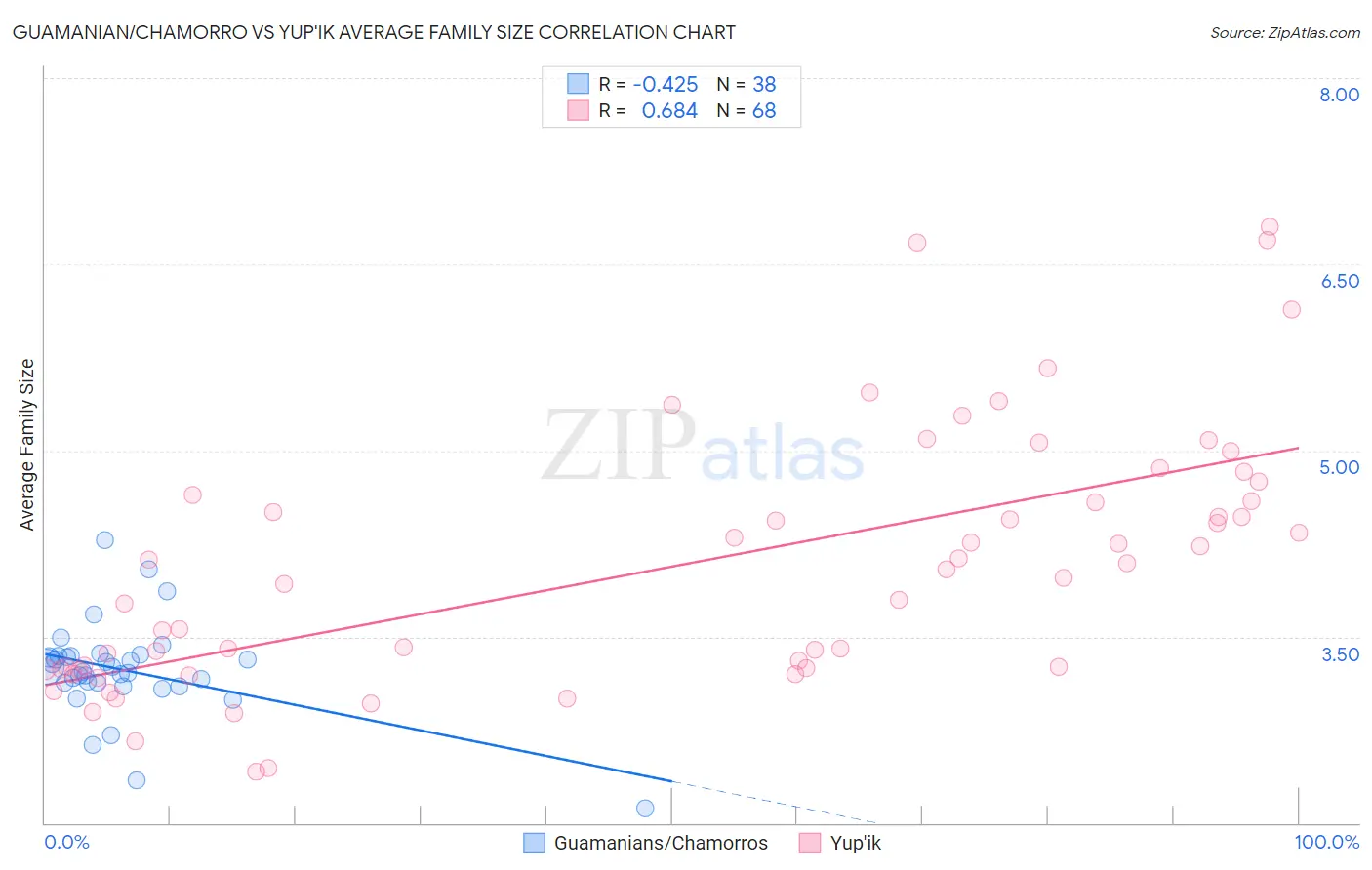Guamanian/Chamorro vs Yup'ik Average Family Size
COMPARE
Guamanian/Chamorro
Yup'ik
Average Family Size
Average Family Size Comparison
Guamanians/Chamorros
Yup'ik
3.29
AVERAGE FAMILY SIZE
98.6/ 100
METRIC RATING
100th/ 347
METRIC RANK
4.00
AVERAGE FAMILY SIZE
100/ 100
METRIC RATING
1st/ 347
METRIC RANK
Guamanian/Chamorro vs Yup'ik Average Family Size Correlation Chart
The statistical analysis conducted on geographies consisting of 221,865,945 people shows a moderate negative correlation between the proportion of Guamanians/Chamorros and average family size in the United States with a correlation coefficient (R) of -0.425 and weighted average of 3.29. Similarly, the statistical analysis conducted on geographies consisting of 39,956,738 people shows a significant positive correlation between the proportion of Yup'ik and average family size in the United States with a correlation coefficient (R) of 0.684 and weighted average of 4.00, a difference of 21.4%.

Average Family Size Correlation Summary
| Measurement | Guamanian/Chamorro | Yup'ik |
| Minimum | 2.12 | 2.41 |
| Maximum | 4.28 | 6.80 |
| Range | 2.16 | 4.39 |
| Mean | 3.23 | 4.07 |
| Median | 3.24 | 4.01 |
| Interquartile 25% (IQ1) | 3.13 | 3.25 |
| Interquartile 75% (IQ3) | 3.34 | 4.61 |
| Interquartile Range (IQR) | 0.21 | 1.37 |
| Standard Deviation (Sample) | 0.38 | 1.02 |
| Standard Deviation (Population) | 0.38 | 1.01 |
Similar Demographics by Average Family Size
Demographics Similar to Guamanians/Chamorros by Average Family Size
In terms of average family size, the demographic groups most similar to Guamanians/Chamorros are Immigrants from Oceania (3.29, a difference of 0.010%), Barbadian (3.29, a difference of 0.010%), Nigerian (3.29, a difference of 0.010%), Immigrants from Burma/Myanmar (3.29, a difference of 0.020%), and West Indian (3.29, a difference of 0.020%).
| Demographics | Rating | Rank | Average Family Size |
| Peruvians | 99.2 /100 | #93 | Exceptional 3.30 |
| Sierra Leoneans | 99.0 /100 | #94 | Exceptional 3.30 |
| Immigrants | Lebanon | 99.0 /100 | #95 | Exceptional 3.30 |
| U.S. Virgin Islanders | 98.8 /100 | #96 | Exceptional 3.29 |
| Immigrants | Oceania | 98.7 /100 | #97 | Exceptional 3.29 |
| Barbadians | 98.6 /100 | #98 | Exceptional 3.29 |
| Nigerians | 98.6 /100 | #99 | Exceptional 3.29 |
| Guamanians/Chamorros | 98.6 /100 | #100 | Exceptional 3.29 |
| Immigrants | Burma/Myanmar | 98.6 /100 | #101 | Exceptional 3.29 |
| West Indians | 98.5 /100 | #102 | Exceptional 3.29 |
| Immigrants | Western Africa | 98.4 /100 | #103 | Exceptional 3.29 |
| Bolivians | 98.3 /100 | #104 | Exceptional 3.29 |
| Immigrants | Ghana | 98.1 /100 | #105 | Exceptional 3.29 |
| Paiute | 98.0 /100 | #106 | Exceptional 3.29 |
| Ghanaians | 98.0 /100 | #107 | Exceptional 3.29 |
Demographics Similar to Yup'ik by Average Family Size
In terms of average family size, the demographic groups most similar to Yup'ik are Crow (3.82, a difference of 4.5%), Pueblo (3.79, a difference of 5.3%), Pima (3.75, a difference of 6.7%), Navajo (3.65, a difference of 9.6%), and Arapaho (3.64, a difference of 9.9%).
| Demographics | Rating | Rank | Average Family Size |
| Yup'ik | 100 /100 | #1 | Exceptional 4.00 |
| Crow | 100 /100 | #2 | Exceptional 3.82 |
| Pueblo | 100 /100 | #3 | Exceptional 3.79 |
| Pima | 100 /100 | #4 | Exceptional 3.75 |
| Navajo | 100.0 /100 | #5 | Exceptional 3.65 |
| Arapaho | 100.0 /100 | #6 | Exceptional 3.64 |
| Inupiat | 100.0 /100 | #7 | Exceptional 3.63 |
| Immigrants | Yemen | 100.0 /100 | #8 | Exceptional 3.60 |
| Hopi | 100.0 /100 | #9 | Exceptional 3.60 |
| Spanish American Indians | 100.0 /100 | #10 | Exceptional 3.58 |
| Tohono O'odham | 100.0 /100 | #11 | Exceptional 3.53 |
| Immigrants | Mexico | 100.0 /100 | #12 | Exceptional 3.52 |
| Sioux | 100.0 /100 | #13 | Exceptional 3.52 |
| Immigrants | Central America | 100.0 /100 | #14 | Exceptional 3.49 |
| Tongans | 100.0 /100 | #15 | Exceptional 3.49 |